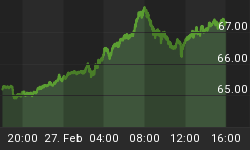The U.S. Dollar is trading higher overnight based on oversold technical conditions. Yesterday's comments from Fed Chairman Bernanke regarding the Dollar may also be triggering a short-covering rally as well a position-lightening. The overnight action has not been sufficient enough to call for a change in trend.
Yesterday, Bernanke expressed concern for the Dollar, which was a surprise to some since the Fed Chairman rarely talks about the U.S. currency. In his speech, he said he remains committed to a strong Dollar like the Treasurer usually says, but he failed to come up with a strategy to boost the greenback. In addition, he talked about interest rates remaining "exceptionally low" for "an extended period". It's hard to believe that the long-term down trend will change for the Dollar given that interest rates are expected to remain low.
The short-term trend may reverse temporarily because traders usually get nervous whenever a central bank official talks about their currency. This usually leads to counter-trend trading as investors reel in profits and adjust positions to protect their exposure to any sudden changes. This appears to be what is going on overnight and could develop into the theme for the day.
Although he talked about the Dollar, Bernanke's main concern is to protect his mandate to grow employment and protect price stability. It is likely that he will accept a lower Dollar as long as it doesn't interfere with his plans. The problem is interest rates. If he raises rates too soon to protect the Dollar then he may derail the economic recovery.
The December Euro is trading lower overnight. Each time this market has approached the $1.500 area there has been selling pressure. Traders seem to fear the wrath of the European Central Bank if the Euro rises too far, too fast. Early this morning, ECB President Trichet made a comment which in effect was an attempt to talk up the Dollar. Technically, the Euro could break back to 1.4837 to 1.4825.
The December British Pound is weaker this morning. Yesterday's rally was triggered by positive comments from Bank of England member Andrew Sentance. This was a departure from last week's comments from BoE Governor King who tried to talk down the British Pound. The charts indicate a possible pullback to 1.6706 to 1.6697.
Short-term oversold conditions and the fear that the Bank of Canada may enter the market to drive down the currency are helping to boost the U.S. Dollar versus the Canadian Dollar.
The strong rise in the Dollar is helping to pressure December Gold. This is giving investors an excuse to take profits. The trend remains up so traders should treat this move as a correction rather than a change in trend. Speculation has been driving this market higher. Traders are anticipating inflation but if it doesn't begin to show up soon, there may be a sharp correction. Central bank buying has also been a key influence on this market.
Equity markets are trading a little weaker on the opening. Yesterday this market stalled after an early morning surge and sold off into the close. Negative comments from analyst Meredith Whitney are said to have been the catalyst for the break as investors took a little money off the table after the recent rally. Traders continue to question valuation in this market, but as long as the Dollar remains low, have no strong reason not to buy stocks.
Treasury futures surged to the upside on Monday, but are trading weaker overnight. Yesterday's initial rally was triggered by a revision in the September Retail Sales number. The second wave of buying came after Fed Chairman Bernanke said interest rates would remain "exceptionally low" for "an extended period".
Speculators triggered a short-covering rally in December Crude Oil which is not expected to last. Lower equity prices and a stronger Dollar could drive this market lower today. The bearish supply/demand scenario is strong enough to limit gains.















